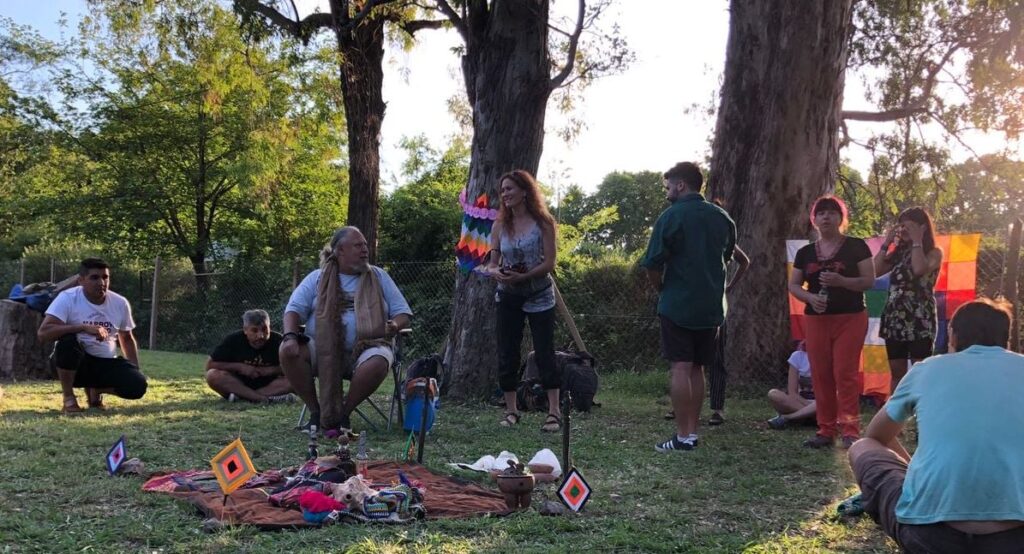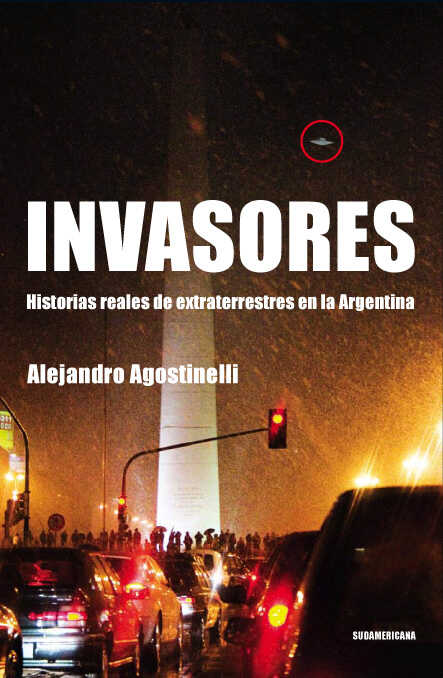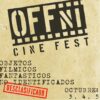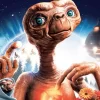It was an international academic meeting dedicated to discussing methodologies and possible approaches to different anomalous phenomena. Organized by Dr. Jeffrey J. Kripal, it took place in Houston from March 3 to 6.
The Argentine author Sebastiano De Filippi presented a manifesto at the event that excited a demanding audience.
Hacer click para acceder a traducción al castellano
Due to a series of circumstances –especially related to media– that perhaps we still do not have enough perspective to fully understand, an almost feverish frenzy has been triggered in the United States by ufological, paranormal and extrahuman mysteries. Thus, many authors, documentarians and even, as we shall see, scholars seek practical categories to encompass subjects that are not always related and that tend to fill bags with delicious cultural candies labeled as “supernatural”, “paranormal”, “unusual”, “unexplained” or “paranatural”.
The semantic challenge is real: they are related topics, but, after thinking about it a bit, we come to the conclusion that all blankets fall short.
Perhaps one of the academic successes that no one can dispute Dr. Jeffrey J. Kripal, one of the best known scholars in the study of religions and Asian mysticism, the history of Western esotericism and counterculture, is that he found the way to do accommodate this heterogeneity. He simply called it “the impossible”.
What is his definition of “impossible”? It’s “things that shouldn’t happen and yet do”. The attempt is not bad and is one of the topics of conversation in his “J. Newton Rayzor” Chair of Philosophy and Religious Thought at Rice University in Houston, Texas. Not surprisingly, for years doctoral students from all over the world have come to Rice to study their doctoral thesis topics, inspired by unconventional phenomena, under Kripal’s supervision.
Kripal, who is also a member of the boards at the Bigelow Institute for Consciousness Studies in Las Vegas, Nevada, financed by hotel and aerospace magnate Robert Bigelow, and the Esalen Institute in Big Sur, California, has the ability to overcome challenges; for example, the epistemological crossroads that the concept “impossible” presents. Why predefine “impossible” as the trigger for a presumed anomalous experience?
“I understand that the word «paranormal» usually makes scholars uncomfortable, but what we will show is that the original French word, which meant something like «super natural», and its related categories were created by scientists and scholars in places like Cambridge, Duke and Harvard. All in all, this initiative is intellectual and has a deep scientific, social-scientific and humanistic interest to this day”, Kripal explained.

A subtopic that attracts the most attention in these debates is in the orbit of the so-called studies on consciousness, a fertile and almost newborn area of research in neuroscience. Of course, to deepen the evolution and the neurological foundations of consciousness, biologists, psychiatrists and neurologists are needed to study genetic and biological mechanisms, but also psychologists, anthropologists and sociologists, who will account for another key side to mental phenomena, the mechanisms of cognition and behavior.
Where to look for “the impossible” from those premises? In out-of-body experiences? Maybe. In alien abductions? Probably. In the so-called phenomena of extra-sensory perception? Why not. No one with a healthy scientific curiosity should avoid answering the questions that these problems pose.
Now, if this kind of study, which with the anthropologist Ignacio Cabria we called “liminal” in the ’90s, is rejected in mainstream scientific conferences, or gets stuck in the revolving doors of accredited scientific publications, why not create a current of “alternative research” that gives rise to non-traditional concerns? (*)

Archives of the… Impossible?
This question led Professor Kripal to convince Rice University to create the “Archives of the Impossible”. The results of his call are not to be underestimated by those of us who enjoy not only stimulating reading but knowing that one can go to certain places to consult the original sources. So far, these Archives host nine collections:
1) The “Anne and Whitley Strieber” Collection, donated by the same writer, with thousands of letters that alleged abductees sent to the couple since 1987, the year of publication of the book “Communion – A True Story”, a work whose “cover girl” inmediately marked a before and after in the history of abductions.
2) The “Jacques Vallée” Collection, donated by the prolific Franco-American author, which includes all of his personal research files on UFOs and other strange phenomena.
3) The «Edwin C. May» Collection, donated by himself, who was president and founder of the Laboratories for Fundamental Research in Palo Alto, California, with the declassified reports of his official and personal research on “remote viewing” of the project called Star Gate.
4) The “Stewart Alexander” Collection, donated through journalist Leslie Kean, which includes part of the library and all the personal notes of the British medium.
5) The “Richard F. Haines” Collection, donated by the psychologist and ufologist who is the author, among others, of “UFO Phenomena and the Behavioral Scientist” (unpublished in Spanish, 1979), with all of his personal and institutional research files on the UFO phenomenon.
6) The “Brenda Denzler” Collection, donated by this doctor in Religious Studies from Duke University and author of “The Lure of the Edge: Scientific Passions, Religious Beliefs, and the Pursuit of UFOs” (unpublished in Spanish, 2003), donated through Professor Diana Walsh Pasulka, which includes a collection of UFO news clippings covering twenty years.
7) The “Stanley Krippner” Collection, donated by the famous parapsychologist, with all of his published and unpublished writings, plus all kinds of personal handwritten documents.
8) The “Jeffrey J. Kripal” Collection, donated by him, which includes essays, correspondence, research notes and lecture materials dating back to the 1970s.

9) The “Larry W. Bryant” Collection, donated by the author of “UFO Politics at the White House” (unpublished in Spanish, 2015), with his entire personal archive of published and unpublished works, photographs, newspaper clippings and others.
This massive archive, housed in one of the Rice University campus libraries, deserved a sort of ceremonial setting. This is how Kripal decided to organize an international academic congress on “the impossible”, which began remotely with three webinars in which Kripal spoke with professors John Phillip Santos, Priscilla Wald and Hussein Ali Agrama, and which continued in person from March 3 to 6.
In total there were eight speakers: Kripal himself, Jacques Vallée, Leslie Kean, Whitley Strieber, Diana Walsh Pasulka, John Phillip Santos, Edwin C. May and Sebastiano De Filippi, whose lectures were broadcast live via Zoom.
There were also panel discussions involving researchers, academics and journalists, including Kathleen Canning, Clas Svahn, Stephen Finley, Paul H. Smith, Michael Masters, Eric Wargo and Joseph Laycock.

While the vast majority of those present were American, there were guests from India, Russia, Sweden, England, France and Canada. An isolated Latin American presence called attention. Probably due to his dual nationality, apart from his career in the specialty, the presence of the Italian-Argentine Sebastiano De Filippi, current Music Director of the National Congress Chamber Orchestra, trained in social sciences and author of two important books: “La Ciudad de la Llama Azul: Luces y sombras sobre el cerro Uritorco” (2018) and “Los Señores del Uritorco: La verdadera historia de los comechingones” (2019), the latter co-authored with Fernando Jorge Soto Roland, a professor of History from the University of Mar del Plata.
In 2021 De Filippi directed a collective work, “Proyecto Erks”, which brought together contributions from twelve university authors on the mysterious “Uritorco area”. So many efforts had to bear some fruit. The manuscript found its way into Kripal’s hands and he dedicated a laudatory foreword to it (published at the time in Factor).
Soon, the eight lectures will be published by Rice University on the YouTube channel of its Faculty of Humanities and will be compiled in a book published by Columbia University Press in New York.
Pacha Mama’s UAPs
A delegation is usually made up of several people. In this case, only one attended for Argentina and had not been delegated or commissioned by anyone: De Filippi was invited individually and not as a representative of other groups or people. Since they met, Kripal and De Filippi have had an intense correspondence. From that exchange came Kripal’s invitation to participate in a meeting “behind closed doors” held at the Esalen Institute in Big Sur. There, the Argentine spent a week in seclusion with scientists, teachers, researchers, writers, psychologists, journalists, patrons and retired intelligence agents.
Psychologist Juan Acevedo Peinado was also invited to participate at the Rice University conference, but declined for reasons of force majeure.

Who is Acevedo? A former inhabitant of the vernacular ufoland and ideologue of the CIFO (Círculo de Investigadores del Fenómeno Ovni) of Rosario, Juan later claimed to have been initiated by his father in the Guarani ancestral traditions.
He was born in 1961 in the city of Buenos Aires and graduated as a psychologist at the National University of Rosario. Shortly after founding the Comunitario Otorongo Wasi, he wrote “Plantas Sagradas: El linaje secreto del shamanismo sudamericano” (Grijalbo, 2016) and “El Shinkal y su Inty Raymi: El renacer de los olvidados” (2017). Before, with Néstor Berlanda, he wrote “Los Extraños: Abducciones extraterrestres en la Argentina” (Emecé, 2000 – RA, 2019). In the ‘90s, with his colleagues from CIFO, he developed a recently recovered project in the volume “CIFO – El Legado: Tratado de metaufología del siglo XX para el siglo XXI” (2019), where he outlines a theory for whose definition he resorted to a not very indigenous anglicism: “That”.
In search of nuances for this report, I listened to the “Demonios” show, where Acevedo confided to his host, Carlos Iurchuk, that although both he and De Filippi had been invited, the latter was acting as “Argentina’s delegate”.
In the interview we learned of the «enormous gravitation» that he had in Sebastiano’s presentation and he commented that the new winds that run places like Rice University are the result of the work that, he assures, he and CIFO have been carrying out since 1991.
Lighting one cigarette after another and with a somewhat alien gaze, as lost in the distance, a Juan sunk in the comfort of his ancestral wisdom unraveled before a disoriented Iurchuk those truths that from a kind of inscrutable cloister someone allowed him to reveal in small drops. Now, Acevedo’s fervor for the American university’s initiative denotes an important change of perspective.
In August 2021, also on the “Demonios” channel, Acevedo released a statement by CAPEN (Círculo Argentino para la Perspectiva Noética) entitled “Manifesto of the Libertarian «South American Phenomenology»”. It is a ufopolitical text whose enigmatic author, apart from collecting ideas from Acevedo, claims the ancestral mystery that South American identity entails, horizontality and the search for liberation from “cipayismo and cultural hegemony”, so that imagination, subjectivity and ignorance may reign. They invite to “retrace 500 years of cultural enslavemente” and they say «ENOUGH to the media clowns forger of submissive and dependent slaves who wait for «contact» with their parents from up North”. These “children of the Pacha” claim to be “apprentices of a TELURIC INTELLIGENT CONSCIOUSNESS”.
This indigenist claim, which assures, among other things, “not to seek recognition”, comes out at the crossroads of the reports on UAPs investigated by is called American imperialism and does not seem to take note of the first lines of the official communiqué from Rice University:
“In 2021, the United States government published a preliminary report on unidentified aerial phenomena (UAP), more commonly known as UFOs, after decades of denial and misinformation on the existence and investigation of these unexplained experiences.” (Quote)
That heading positions Rice University on the only issue that the scholars and the South American shamans who sign the document seem to agree on, which is “negativism” and “disinformation” (about the existence of UAPs, a type of reports whose existence no one in their right mind should deny).
But the main reason for astonishment is another and simpler: as far as is known, Acevedo was only one more spectator of the eight lectures’ broadcast through Zoom, like most of us mortals, since the other panels and meetings were not broadcast. To date, only the three webinars are available on YouTube.
De Filippi was the only Argentine (and Italian, I might add) at the Archives’ opening conference. The responsibility was double and even unusual: our compatriot was chosen to close the activities with the last lectura, after personalities such as Jacques Vallée.
The Rice Manifesto
De Filippi had a gesture of generosity: he brought to Houston not only his own thoughts, but also some of the work by other contemporary Argentine authors who have dedicated books to these topics, whom he named in his talk, and he circulated a PDF showing the covers and publication details of 31 books by those writers.
He promoted generating this diffusion entirely motu proprio and included in this selection all the living Argentine authors of books on the area of interest, with total disregard for both his relationship (or lack of it) with each writer, as well as his agreement (or disagreement) with their respective ideas. His intention was “to make known in the «center» some of the work that is produced today in this «periphery»”.
In his lectura entitled “The Spectral College: Beyond reasoners and believers”, De Filippi offered eight points on which to agree on a plan “to approach the study of the impossible in a balanced and serious, humane and humanistic way, which does not cultivate any kind of fanaticism: neither that of an excessive skeptical and scientific closeness a priori, nor that of a pernicious pseudo-spiritual irrationality a fortiori”.
This program had such an echo that a German journalist called it “the Rice Manifesto”. It goes like this:
1) Get community interest, public support, and private funding for a comprehensive approach to the impossible.
2) Study the impossible within the official academic world, with different methodologies according to each discipline.
3) Disseminate the studies of the impossible and take them to the mass media in a credible way.
4) Engage the disbelief of the overly materialistic, rationalistic, scientific, and positivist reasoners.
5) Engage the belief of the overly metaphysical, irrational, anti-scientific, and negativist believers.
6) Consolidate a scientific and epistemological paradigm shift, already underway in the hard sciences, in line with what Kuhn theorized.
7) Seek a cognitive and ontological paradigm in which sapiens embraces a radical environmentalism and the impossible as possible.
8) Connect researchers who have been working in isolation due to geographical, linguistic, and financial constraints.

We still do not know how the ideas that De Filippi expressed at Rice can be put into practice. Some of his statements excited many participants ready to start a debate that will inevitably be ideological in the face of the ways of approaching “anomalous phenomena”: it is an environment where many interlocutors cultivate postmodern visions, perhaps clinging to the idea that heterodoxy is a merit per se and, at the same time, they mistrust scientific epistemology, perhaps its remarkable record of successes being their main comparative advantage over certain new age worldviews.
When Kripal introduced De Filippi, he characterized the Argentine as “someone to learn from”.
In any case, there seems to be a “before and after” for all those who participated in this conference. Let’s see how this effort bears fruit.
Note
(*) Agostinelli, Alejandro César; and Cabria, Ignacio [1994]: Work document for the “Cuadernos de Ufología” organizers’ and contributor’s meeting, introducing the «Proyecto Liminal, fenómenos y conocimientos en los márgenes de la cultura». Mendoza, Argentina. 10 pages. Unpublished.
RELATED NOTES / EVENTOS ANÓMALOS







